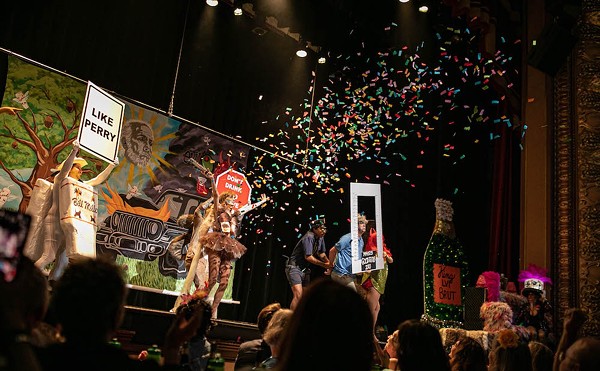|
A new radio series checks in on Central America after the wars and considers how its refugees have changed the U.S. The peace accords of the 1990s brought a much-welcome end to the fighting in Central America, some of which had been going on for decades. But what happens in the aftermath? How do those countries rebuild and their communities heal? And what are the implications for the United States, whose assistance, provided in the name of democracy, exacerbated some conflicts and was withheld from others? Después de las Guerras: Central America After the Wars, a provocative new 13-part radio documentary produced and aired by Austin-based LatinoUSA, examines the legacy of wars in Nicaragua, El Salvador, and Guatemala and its impact on Latinos in the United States. Producer Maria Martin sees the series as an opportunity to cover issues that bear a resemblance to the current situation in Iraq. As the immediacy and glamour of Central America's civil wars gave way to the more strenuous task of rebuilding and restoration in the years following the peace accords, newsrooms gradually reduced their coverage of the area until it was virtually non-existent - a trend they followed throughout the world. An interest in international affairs reemerged following the events of 9-11, but, as the media rushed to follow the latest developments in the Middle East, Central America remained "a part of the world the word had stopped watching," she says. "There is an important lesson for the part of the world they are watching: Democracy is a difficult process. It doesn't happen overnight." With new democracies come free market economies - which, while good for a few, Martin points out, "have not, to this point, been the best thing for the masses." During the 1980s, the ideological battle against communism still held considerable sway as the Cold War waned. As the United States couched their involvement in Central America as a struggle between communism and democracy, President Ronald Reagan cast the U.S.-backed contras as "the moral equals `of` our Founding Fathers." Within this context "it was OK for us to fund `Nicaraguan dictator Anastasio` Somoza," says Martin - although, had the full extent of the atrocities committed in the name of democracy become front page news, she believes "a lot of Americans would have been appalled." In the wake of the Central American conflicts, the United States received waves of immigrants - welcoming some, like the nicaragüenses who arrived following the downfall of Somoza, while denying refugee status to others, like salvadoreños and guatemaltecos fleeing U.S.-backed regimes. "We have to be prepared for the consequences of intervention," Martin says, including the destabilization of a region, and we don't appear to have learned this lesson. As a result, many Central Americans "feel abandoned in some ways by the U.S."
The series - largely a collaborative effort between Central American and U.S. Latino journalists - is international in scope, but it is local in nature, says Martin. Since the '80s, the Central American community in the United States has grown exponentially. In addition to their "history of grace and struggle," Martin says they add another layer of complexity to the identity of American Latinos. "Through Central Americans the indigenous character of who it is we are as Latinos comes back and resonates with us." Yet, the refugee community faces conditions that have not substantially improved, either in the states or in their home countries. Although events in Central America no longer make front page news, Martin suggests Central Americans are closer to us than they ever were, due to their dependence on remittances from emigrants to the United States. (In El Salvador, for example, banking has replaced agriculture as the nation's top industry.) Once here, however, these immigrants face an increasingly difficult time securing decent employment; their refugee and citizenship status often complicates their entry into a racially stratified job market. According to a recent report released by the Pew Hispanic Center, the median net worth of Hispanic households in 2002 was a paltry $7, 932. First-generation Cubans ranked highest, with a median net worth of nearly $40,000, while first-generation Mexican Americans' median net worth hovered around $7,600. Immigrants from Central America had a median net worth of only $2,508. In contrast, the median net worth for non-Hispanic white households for the same year was $88,651. Martin hopes the series will raise interest in and awareness about Central American communities, especially among Latino community organizations. She's already planning a follow-up which will take a more in-depth look at how Central Americans are changing the face of Latino communities in places like San Francisco, Los Angeles, and Washington, D.C, where there are sizable Nicaraguan and Salvadoran populations, as well as cities such as San Antonio, where their numbers are considerably smaller and their presence tends to be overlooked. Ultimately, Martin believes that Después de las Guerras presents an optimistic message, if we listen. "Coming out of a legacy of violence and dislocation," she says, "there's something in the Central American character of warmth and struggle. In spite of the poverty, in spite of the wars, the fact is that they continue to come to work and make their families better. "The immigrant spirit is a spirit of hope. Certainly, that spirit has re-energized our Latino community and re-energized the United States as a whole." • Después de las Guerras airs locally on National Public Radio, KSTX 89.1 FM, as part of the weekly Latino USA series. It may be heard on Fridays from noon to 12:30 p.m. and 9 to 9:30 p.m., Saturdays from 6-6:30 a.m., and Sunday from 7 to 7:30 a.m through January. Additionally, the program is available over the Internet through www.latinousa.org.
|
Part of the world the world had stopped watching
Wed, Dec 22, 2004 at 12:00 am

KEEP SA CURRENT!
Since 1986, the SA Current has served as the free, independent voice of San Antonio, and we want to keep it that way.
Becoming an SA Current Supporter for as little as $5 a month allows us to continue offering readers access to our coverage of local news, food, nightlife, events, and culture with no paywalls.
Scroll to read more Arts Stories & Interviews articles
Newsletters
Join SA Current Newsletters
Subscribe now to get the latest news delivered right to your inbox.















